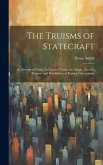Here, in one volume, are the collected essays of influential American philosopher WILLIAM JAMES (1842-1910), whose justifications of religious faith and explorations of questions of morality made him one of the most popular thinkers of the 19th century. In this volume, first published in book form in 1897, James ponders such conundrums as: . Is life worth living? . the sentiment of rationality . the dilemma of determinism . the moral philosopher and the moral life . great men and their environment . the importance of individuals . what psychical research has accomplished . and more. Readers of modern philosophy, students of Christian theology will find this an enlightening work
Hinweis: Dieser Artikel kann nur an eine deutsche Lieferadresse ausgeliefert werden.
Hinweis: Dieser Artikel kann nur an eine deutsche Lieferadresse ausgeliefert werden.








